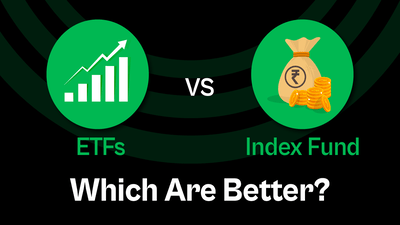Investing has become an essential part of financial planning, and choosing the right investment vehicle is crucial to achieving your financial goals. Among the popular options available to investors today are index funds and exchange-traded funds (ETFs). Both options have gained traction in recent years due to their benefits, including diversification, cost-effectiveness, and ease of use. However, they also have distinct characteristics that can influence your investment decisions.

Understanding Index Funds
What Are Index Funds?
Index funds are mutual funds designed to track the performance of a specific market index, such as the S&P 500 or the Dow Jones Industrial Average. These funds aim to replicate the performance of the underlying index by holding the same securities in the same proportions as the index. By investing in an index fund, you essentially gain exposure to a broad range of stocks or bonds without needing to purchase each individual security.
How Index Funds Work
Index funds are passively managed, which means they do not have active fund managers making buy or sell decisions based on market forecasts. Instead, they follow a "buy and hold" approach, automatically adjusting the portfolio to reflect changes in the index. This passive management style typically results in lower expense ratios compared to actively managed funds, making index funds an appealing option for cost-conscious investors.
Understanding ETFs
What Are ETFs?
ETFs, or exchange-traded funds, are investment funds that are traded on stock exchanges like individual stocks. Like index funds, many ETFs aim to track a specific index or sector. However, ETFs can also include a variety of asset classes, including commodities, currencies, and bonds, allowing investors to gain exposure to different investment opportunities.
How ETFs Work
ETFs are also generally passively managed, but their key difference lies in how they are traded. ETF shares can be bought and sold throughout the trading day, just like stocks. This provides investors with greater flexibility in managing their investments. Depending on market conditions, ETFs can be purchased at varying prices throughout the day, which can impact investment strategies and return potential.
Key Differences Between Index Funds and ETFs
While index funds and ETFs share several similarities, they also have crucial differences that can affect your investment strategy. Below are some of the primary distinctions between the two:
1. Trading Flexibility
-
Index Funds: Transactions for index funds occur at the end of the trading day. When you place an order to buy or sell an index fund, the transaction is executed at the fund's net asset value (NAV), which is calculated at the close of the market.
-
ETFs: ETFs can be traded throughout the day on stock exchanges at market prices that fluctuate based on supply and demand. This allows investors to take advantage of intra-day price swings, making ETFs more suitable for those who want more trading flexibility.
2. Cost Structure
-
Expense Ratios: While both index funds and ETFs typically have lower expense ratios compared to actively managed funds, ETFs often have an advantage in this area. The average expense ratio for index funds tends to be slightly higher compared to that of ETFs.
-
Transaction Costs: When buying index funds, investors may face a minimum investment requirement but generally do not incur trading commissions. In contrast, purchasing ETFs usually involves broker commissions and trading fees, making it important for investors to consider the impact of these costs on their overall returns.
3. Tax Efficiency
-
Index Funds: Index funds can distribute capital gains to shareholders when the manager sells securities in the fund. This can lead to tax liabilities for investors in taxable accounts.
-
ETFs: Due to their unique "in-kind" creation and redemption process, ETFs tend to be more tax-efficient. This mechanism allows ETFs to minimize capital gains distributions, which can benefit investors by reducing their tax liabilities.
4. Minimum Investment Requirements
-
Index Funds: Many index funds have minimum investment requirements, which can range from a few hundred to several thousand dollars. This may pose a barrier for some investors.
-
ETFs: ETFs do not have minimum investment requirements beyond the price of a single share. As a result, they can be more accessible for investors with limited capital.
5. Management and Strategy
-
Index Funds: Index funds passively track a specific index and automatically adjust their portfolios to reflect index changes. This makes them a straightforward option for investors seeking a simple, long-term investment strategy.
-
ETFs: While many ETFs are also passively managed, there are actively managed ETFs that might try to outperform market indices. This flexibility makes ETFs suitable for investors looking for specific investment strategies beyond simple index tracking.

Advantages of Index Funds
1. Simplicity and Transparency
Index funds are simple to understand, as they track well-known indices. This transparency allows investors to know exactly what they are investing in.
2. Lower Expense Ratios
Typically, index funds offer lower expense ratios than actively managed funds, contributing to better long-term performance due to lower fees.
3. Long-Term Growth Potential
Due to their broad market exposure, index funds often reflect the overall growth of the market over time. This makes them suitable for long-term investment horizons, especially for retirement accounts.
Advantages of ETFs
1. Trading Flexibility
ETFs can be traded at any time during the trading day, providing investors with the ability to take advantage of market fluctuations and execute more tactical investment strategies.
2. Lower Tax Consequences
ETFs are generally more tax-efficient than index funds, making them a favorable choice for investors looking to minimize tax liabilities.
3. Variety of Options
ETFs offer a wide range of investment options beyond just equity or bond indices, allowing investors to diversify their portfolios more effectively.
Disadvantages of Index Funds
1. Limited Trading Opportunities
Index funds can only be bought or sold at the end of the trading day, limiting the ability to react quickly to market changes.
2. Minimum Investment Requirements
Many index funds require minimum investments, which may exclude some investors from participating.
Disadvantages of ETFs
1. Trading Costs
Investors may incur broker commissions and fees when buying or selling ETF shares, especially if they trade frequently.
2. Price Fluctuations
The market price of an ETF can deviate from its underlying net asset value, particularly in volatile market conditions. This can result in investors paying a premium or receiving a discount when they buy or sell shares.
Which Investment Is Right for You?
Choosing between index funds and ETFs depends on your investment objectives, risk tolerance, and personal preferences. Below are some considerations to help you make an informed decision.
1. Investment Objectives
- If you are focused on long-term growth through a simple and straightforward investment strategy, index funds may be more suitable.
- If you seek greater flexibility and the ability to react to market conditions, ETFs may be a better fit.
2. Trading Style
- If you prefer a buy-and-hold strategy with minimal trading activity, index funds may align better with your approach.
- If you are an active trader or enjoy making tactical decisions in response to market changes, consider ETFs.
3. Tax Considerations
- If you are investing in a tax-advantaged account, such as an IRA or 401(k), the tax efficiency of either option may be less significant.
- If you are investing in a taxable account, the potential for lower capital gains distributions may make ETFs more appealing.
4. Accessibility and Costs
- If you have limited capital and want to invest smaller amounts regularly, ETFs might be more accessible due to the lack of minimum investment requirements.
- If you prefer not to pay transaction fees, index funds that do not charge commissions may be a better option.
Conclusion
Both index funds and ETFs offer unique advantages and challenges, and the right choice for you depends on your individual investment goals, trading style, and preferences. Understanding the differences between these two investment vehicles allows you to make informed decisions that align with your financial aspirations.
As you navigate the investment landscape, consider your risk tolerance, time horizon, and personal circumstances. Whether you choose index funds or ETFs, maintaining a diversified portfolio, remaining disciplined in your investment strategy, and staying informed will be key to achieving long-term success.
By carefully evaluating both index funds and ETFs, you can build a solid investment foundation that serves your financial needs and sets you on the path to achieving your wealth-building goals.



